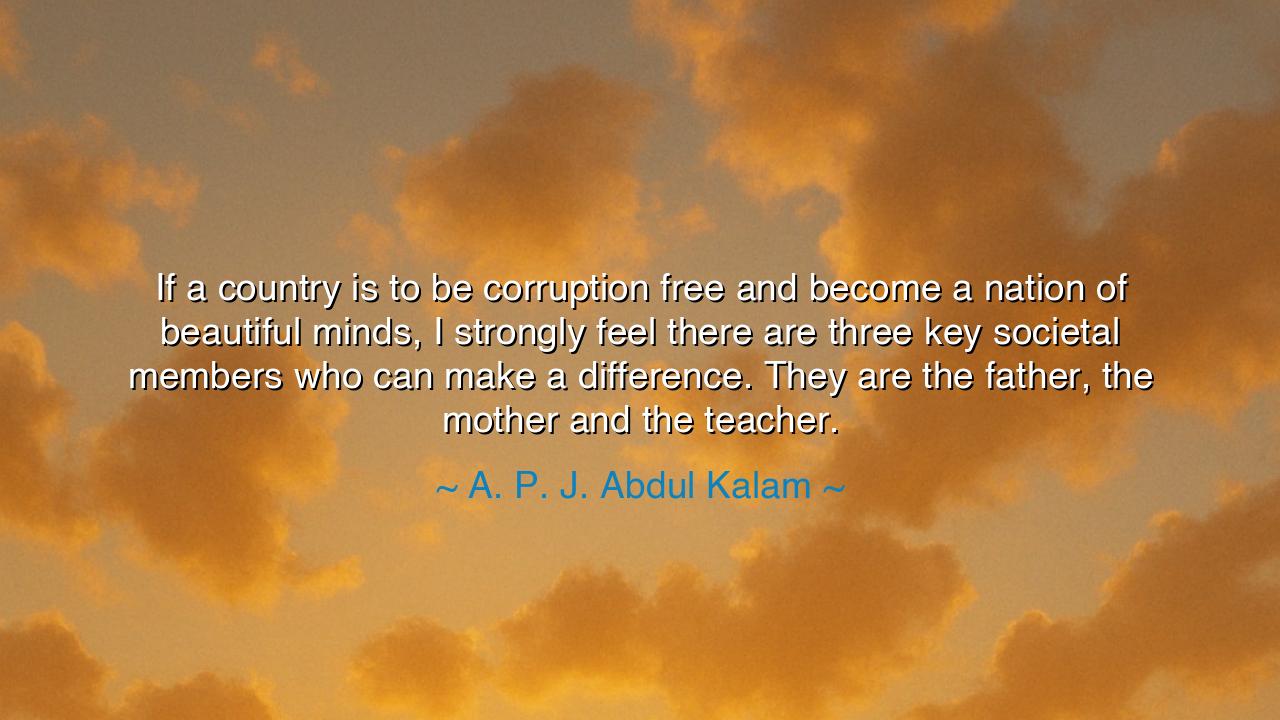
If a country is to be corruption free and become a nation of
If a country is to be corruption free and become a nation of beautiful minds, I strongly feel there are three key societal members who can make a difference. They are the father, the mother and the teacher.






Host: The soft glow of the café lights created a peaceful atmosphere, the rain outside tapping gently against the window, a rhythmic backdrop to the quieter evening. Jack and Jeeny sat across from each other, their cups of coffee nearly empty, but the weight of their conversation had only deepened. Jeeny, always one to challenge the status quo and think beyond the surface, leaned forward slightly, her voice thoughtful as she spoke.
Jeeny: “I came across something by A. P. J. Abdul Kalam that I thought was really powerful. He said, ‘If a country is to be corruption free and become a nation of beautiful minds, I strongly feel there are three key societal members who can make a difference. They are the father, the mother, and the teacher.’” She paused, her gaze steady on Jack. “What do you think? Do you agree with him? Are those the three people who really have the power to shape society?”
Jack: He paused, his fingers tapping lightly on the edge of his coffee cup, his expression thoughtful. “It’s an interesting perspective, isn’t it? I think there’s truth in what he’s saying. When you think about it, those three people—the father, the mother, and the teacher—are the ones who influence a child’s values, morals, and behaviors from the start. The foundation of who a person becomes, in many ways, is built in the home and in the classroom. But I also think it’s more than just these individuals. The environment a child grows up in—the community, the broader society—plays a huge role in shaping their mindset too. What do you think?”
Jeeny: “I see what you mean,” she said, her voice gentle, but her eyes still shining with a quiet intensity. “But I think Kalam’s point is that the foundation is built in those early, intimate environments—the home and the classroom. The father and mother provide the first lessons on right and wrong, on honesty and integrity. And the teacher? They reinforce that, helping children understand the world beyond their immediate family, showing them that their actions have consequences, that their choices matter in the broader scope of society.” She paused, her eyes softening. “If those three—father, mother, and teacher—embrace their roles as mentors in shaping beautiful minds, then they’re not just teaching facts, but also how to think critically, how to care, and how to create a more just world.”
Jack: “I think you’re right,” he said, his voice a bit more reflective now. “Those three figures are the most immediate influences on a child. They’re the ones who shape the way a child sees the world, sees themselves. But there’s something else too, don’t you think? Something about character and integrity that has to come from more than just these individual relationships. The father, mother, and teacher can instill values, but they can only do so much if the society around them doesn’t support those values. How do you create a society of beautiful minds when the broader culture often rewards dishonesty, greed, or corruption? It’s not just about the individuals—it’s about creating a culture that values these principles, too.”
Jeeny: “Absolutely,” she said, nodding in agreement. “But I think Kalam was emphasizing that the personal influence is the first step. If we don’t get that right at the core, how can we expect the larger society to change? You can’t build a beautiful society with beautiful minds if the foundation is cracked. The father, the mother, and the teacher—they’re the ones who have the most direct ability to create that foundation, to nurture those beautiful minds before the world starts pushing its own values on them.” She smiled softly, a quiet understanding in her tone. “If each of us, in those roles, teaches respect, honesty, and kindness, then we’re already planting the seeds of a corruption-free society.”
Host: The rhythm of the conversation felt steady now, like a calm current, and the weight of their exchange began to sink in. The world outside felt distant, muted by the rain and the quiet, but inside the café, the ideas they shared seemed to fill the space between them. The notion that greatness and change began not in the halls of power, but in the quiet moments spent in the home and classroom, was profound.
Jack: “I guess it’s about starting small, isn’t it?” he said, his tone now softer, almost hopeful. “If we want to create a society that values integrity, we can’t wait for it to change from the top down. It has to start with the people closest to us—the father, mother, and teacher who show us how to live with integrity every day. Real change starts when we embrace those roles with care and responsibility. That’s how you begin to build a beautiful society.”
Jeeny: “Exactly,” she said, her voice lightening with a quiet sense of satisfaction. “It’s about creating the right foundation, and nurturing it from the very beginning. Change doesn’t happen overnight, but if we start with the right values at home and in the classroom, that’s when we begin to create a society where integrity and honesty matter. It’s a long-term commitment, but it’s where the real work starts.”
Host: The rain outside had slowed to a gentle drizzle, and the world beyond the café window seemed to quiet into the night. Inside, the conversation between Jack and Jeeny had settled into a peaceful understanding. Perhaps the truth was in those quiet moments of influence—the simple, everyday actions of fathers, mothers, and teachers—that would ultimately shape the society we live in.






AAdministratorAdministrator
Welcome, honored guests. Please leave a comment, we will respond soon